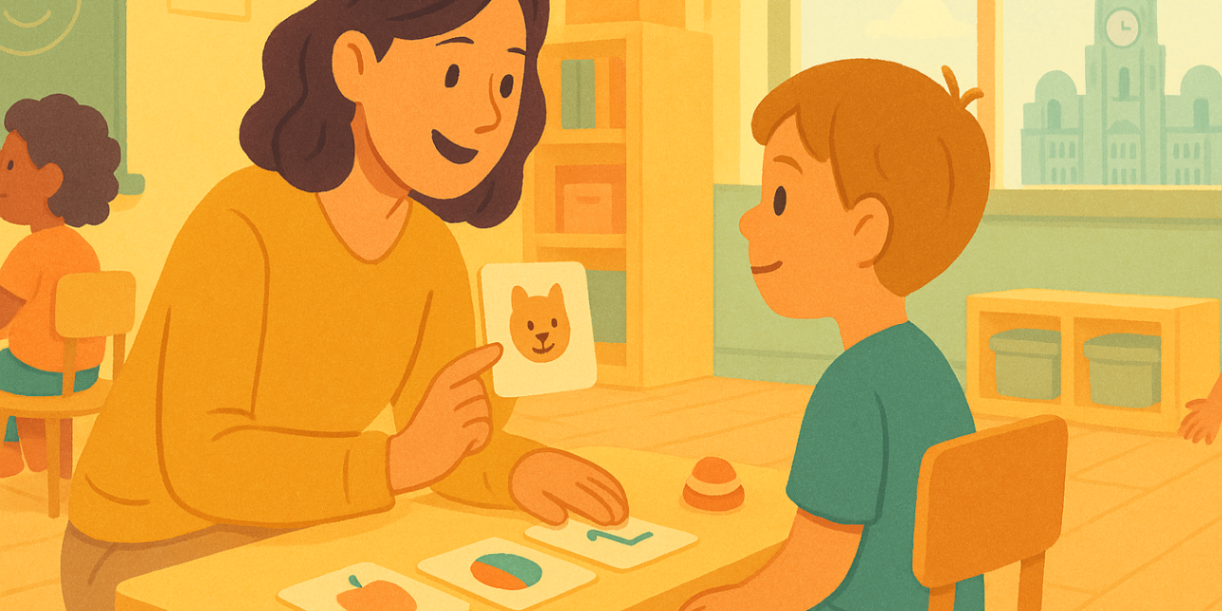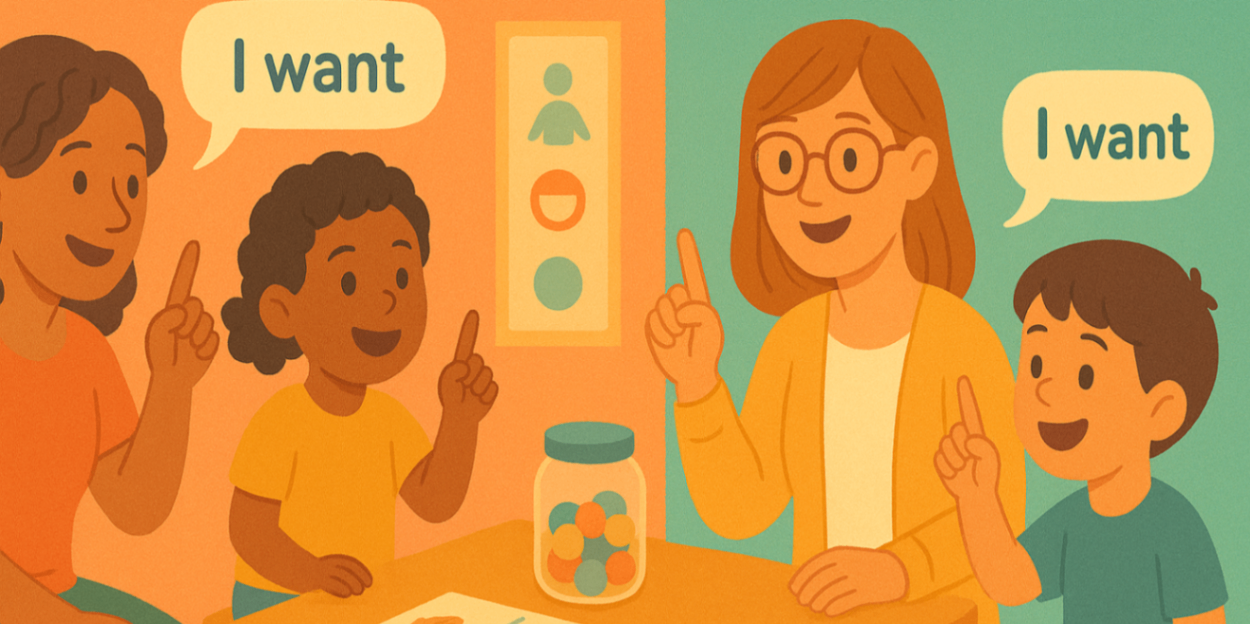
ndis speech therapy liverpool: boosting school readiness for children
1 September, 2025
Getting your child ready for school is about more than their schoolwork. It also means helping them build strong ways to talk and understand others. If your child has trouble with speech or language, speech therapy in Liverpool with the NDIS can help. This support can boost your child's confidence and skills.
When you use NDIS funding, you get special help from speech pathology therapy programs. These programs are made for each child in early childhood and help with what your child needs most. With this support, your child gets a good start for school and life ahead.
Key Highlights
-
NDIS speech therapy in Liverpool provides tailored support to boost your child's school readiness.
-
An experienced team of speech pathologists develops personalised plans to improve communication skills.
-
Speech pathology services help children with developmental delays build skills for independence and well-being.
-
Your NDIS plan can fund various therapy programs, including clinic, mobile, and school-based services.
-
Early intervention is key to achieving positive changes and enhancing your child’s quality of life.
-
A key worker model often integrates speech therapy with other supports like occupational therapy.
Understanding NDIS Speech Therapy for Children in Liverpool

The National Disability Insurance Scheme (NDIS) is made to help people with disabilities get support. It aims to make their quality of life better. For children in Liverpool, the NDIS gives funding for speech pathology services. These services come from health professionals who understand how to help with different communication challenges.
Local NDIS registered provider teams offer support and guidance. They give a range of speech pathology services. Your child can have one-on-one sessions or join group therapy. These can take place in a clinic, at your home, or through telehealth. This means your child can get the right type of help in the way that works best for them. Next, we will talk about how you can qualify for this funding and which types of communication difficulties can get help from these services.
Key NDIS Funding Criteria and Eligibility for Speech Therapy
To get NDIS funding for speech therapy, your child needs to meet set rules. If your child is under seven and has a developmental delay, you can use the NDIS Early Childhood Supports. This pathway helps you get early support for your child, often even if there is no formal diagnosis yet. The goal is to give quick help that meets the child’s needs and brings positive changes early.
If your child is seven or older, there must be proof that they have a lifelong and major disability. This disability must affect how they take part in daily activities. The NDIS will look at if speech therapy is a needed and good support to help your child meet their goals.
To show eligibility for NDIS funding, you usually need to show that your child:
-
Has a disability that will last all their life.
-
Needs help from a speech pathologist to join in daily life.
-
Can get better at communicating and building social skills from therapy.
This makes sure children get the right kind of support for speech therapy through NDIS.
Types of Speech and Language Difficulties Supported by NDIS
NDIS-funded speech pathology can address a wide variety of speech and language difficulties. These therapy services are crucial for early intervention, helping to improve a child's communication skills and overall language development. Whether your child has trouble with sound production, understanding language, or social interaction, a speech pathologist can create a tailored plan.
This support is not limited to one type of issue. It covers a spectrum of challenges that can affect a child’s ability to communicate effectively. From common delays to more complex disorders, the goal is to provide targeted support that makes a tangible difference in their daily life.
Here are some of the difficulties that NDIS-funded speech therapy can help with:
|
Difficulty Type |
Description |
|---|---|
|
Articulation Disorders |
Trouble producing specific sounds correctly. |
|
Language Delays |
Falling behind in understanding or using words and sentences. |
|
Stuttering |
Difficulties with the flow and fluency of speech. |
|
Childhood Apraxia of Speech |
A motor speech disorder where the brain has trouble coordinating the muscle movements for speech. |
|
Social Communication |
Challenges with using language in social situations, such as conversation and making friends. |
The Role of Speech Therapy in Supporting School Readiness

Speech therapy helps your child get ready for school. Strong communication skills are needed for learning in class, and this type of therapy helps your child build these important skills. When your child talks better, knows how to follow instructions, and mixes well with other kids, they become more ready for school life.
Many clinics in Liverpool use an early childhood approach. They offer early help to build the basic skills needed before starting kindergarten. This good support helps kids with social skills. It also helps them feel sure of themselves and have a better quality of life. Next, you will see more about how these programs work and the skill areas they help with.
Early Intervention Strategies for Preschool and Kindergarten Success
Early childhood supports play a big part in helping your child get ready for preschool and kindergarten. Therapy programs use easy methods to teach children basic skills before they start school. These programs are made to be fun, with lots of play-based activities that help kids learn in a natural way. The aim is to support both social skills and communication skills, while also building up resilience.
The first step is to find a registered NDIS therapist in Liverpool. These experts understand what each child needs. They can set up and use plans that fit your child best, like adding positive behaviour support to help with school and classroom time. Parent training is important, too. It helps you know what to do so your child can learn new things at home and not just in therapy sessions.
Key early childhood intervention strategies include:
-
Play-Based Therapy: Your child plays games and takes part in different activities, helping them learn language and social skills. This happens in a relaxed, fun setting.
-
Parent and Caregiver Training: You get tips and ideas for helping your child grow as you go through daily life at home.
-
Goal-Oriented Activities: There is a focus on clear, simple goals like better speech, easier sentences, and improved listening skills.
Skill Areas Targeted: Communication, Social, and Literacy Development
A good speech therapy NDIS plan aims to help with many important skills at the same time for full growth. The main goal is to make your child’s communication skills better. This means helping them say words the right way and also use longer or more tricky sentences. This is needed for your child to say what they want and understand what others tell them.
Speech therapy also helps children build social skills. Kids learn how to take turns when they talk, read body language, and make friends with other children. These social skills help your child get along better in school and other places. Many speech therapy clinics in Liverpool start with these steps early so your child can learn well.
Another big part of speech therapy and any good NDIS plan is supporting your child’s language development and growing their reading and writing skills. Speech therapy gets children ready for school by working on phonological awareness. This means knowing and using the sounds in words. By doing this, speech pathologists give your child the best start for school and learning.
Accessing NDIS-Funded Speech Therapy in Liverpool
Securing NDIS funding for speech pathology services in Liverpool is easier when you know the steps. First, you need to get an approved NDIS plan. This NDIS plan should have funding for therapy support. Once your plan is ready, you can reach out to a local team of therapists and start your child’s speech pathology journey.
Local providers are there to help you use your health services funding. They will guide you through the process, and help with assessments or needed reports. They also help you find the right speech pathology professionals for your needs. The next sections talk about how to apply and how to find a good therapist in Liverpool for speech pathology services using NDIS funding.
The Step-by-Step Process for Applying and Getting Approved
The journey to get NDIS funding starts with the right evidence. The first step is to get an assessment from allied health services, like a speech pathologist. These health professionals will give you a full report about your child’s needs. The report will also say what kind of therapy your child should have. It is a very important part of your NDIS application.
When you have the reports, you need to fill out and send in an NDIS Access Request Form. This form is for you to tell about your child’s disability and the way it changes their daily life. Be sure to add all supporting papers with it. This will help you make a better case for funding.
The application process usually happens in these main steps:
-
You get reports and assessments from health professionals.
-
You fill in the NDIS Access Request Form with clear details.
-
You give the application and all of your evidence to the NDIA for them to look over.
Some providers use a key worker model. This means one main therapist helps to manage all of your child’s services.
How to Find and Verify NDIS Registered Speech Therapists Locally
Once your NDIS plan is approved, the next task is to find a suitable NDIS registered provider. In Liverpool and the broader South Western Sydney region, there are many options, so it's important to choose an experienced team of speech pathologists who can meet your child’s needs. Verifying that a provider is registered ensures they meet the NDIS quality and safety standards.
You can start your search online or by asking for recommendations from your doctor or support coordinator. When you contact a potential provider, do not hesitate to ask about their registration status and the experience of their team of therapists. A reputable provider will be transparent about their credentials.
Here are a few ways to find and verify a registered therapist:
|
Method |
How to Do It |
|---|---|
|
NDIS Provider Finder Tool |
Use the official tool on the NDIS website to search for registered providers in the Liverpool area. |
|
Ask the Provider Directly |
When you contact a clinic, ask if they are an NDIS registered provider and request their registration number. |
|
Word of Mouth |
Speak with other parents or your support coordinator for recommendations of trusted local therapists. |
Choosing the Right NDIS Speech Therapy Provider in Liverpool

Choosing the right registered NDIS provider matters a lot. It can really change your child’s progress and quality of life. Try to find an experienced team of speech pathologists. They should be qualified and also be good at working with your child. The best therapy services make the process feel like a team effort with the therapist, your child, and your whole family.
Think about their approach and the kinds of therapy services they give. Look at their service options too. Do they offer integrated services? Will their therapy fit into what you need? The following sections will look at different therapy models and talk about why a multidisciplinary approach can be good.
Comparing Clinic-Based, School-Based, and Mobile Therapy Options
NDIS-funded therapy programs in Liverpool offer different ways to help fit your family’s needs. Clinic-based services give your child a set space with special tools and fewer distractions than at home. This setup is good for focused, single-person sessions.
Many families choose mobile speech pathologists. These experts come to the home, the school, or another local spot. Your child gets help where they feel comfortable, so it is easier for them to use what they learn every day. This way of working can make things less stressful and may help stick to a regular plan. There are also telehealth services, so your child can join sessions online without leaving the house.
Here’s a quick comparison:
-
Clinic-Based: A dedicated, professional space with specialised resources.
-
Mobile/In-Home: Convenient and allows for practice in a natural setting.
-
School-Based: Integrates therapy into the child's educational environment.
Integrated Services: Speech Therapy Combined with Occupational Therapy
For many children, trouble with talking and understanding can be tied to other parts of child development. That is why it helps when speech pathology works together with occupational therapy. The speech pathologist looks at how a child speaks and listens. The occupational therapist helps with things like moving their hands, using their senses, and getting through daily tasks.
In Liverpool, there are clinics that have a team of therapists. You can find speech pathology, occupational therapy, physiotherapy and other allied health services at the same place. Having the team work together means the speech pathologist and the occupational therapist make a therapy plan that looks at all parts of your child’s growth. The team is able to keep their ideas steady and working well together.
Some of these providers in Liverpool also have physiotherapy. All these health services at one place make it simpler for parents to book appointments. The team can make sure every part of child development is getting support. This way, your child gets full help from the whole team of therapists.
Conclusion
In the end, NDIS speech therapy in Liverpool plays a vital role in preparing children for school by addressing speech and language challenges early. With the right support plans, children can improve communication, build friendships, and develop literacy skills that set them up for long-term success. When parents understand available funding options and choose the right provider, they ensure their child receives the best possible care.
Book your consultation with daar Liverpool today and give your child the speech therapy support they need to feel confident, ready, and strong for school.
Frequently Asked Questions
Are there NDIS speech therapy services available for adults in Liverpool?
Yes, adults in Liverpool and South Western Sydney can get NDIS-funded speech pathology. If you have a lasting disability that makes it hard for you to talk or understand people, you may use your NDIS plan to pay for therapy services from a speech pathologist. This help can make it easier for you to reach your goals and get more from your daily life in Sydney.
What are the benefits of choosing a mobile NDIS speech therapist in Liverpool?
Choosing a mobile speech pathologist in Sydney can make things easier and more comfortable for you. When you pick an NDIS registered provider, they bring therapy programs right to your home. Your child will get to learn in a place he or she already knows, making it simpler to use these new skills in everyday life. This extra help can really improve the quality of life for you and your family.
How do I verify if a Liverpool speech therapy provider is NDIS-registered?
To check if a speech pathology service is a registered NDIS provider, you can use the NDIS Provider Finder tool on the official website. You can also talk to the team of therapists and ask for their NDIS registration details before you start with their health services. This will help you know that they are a trusted group for your speech pathology needs.
.svg)

















